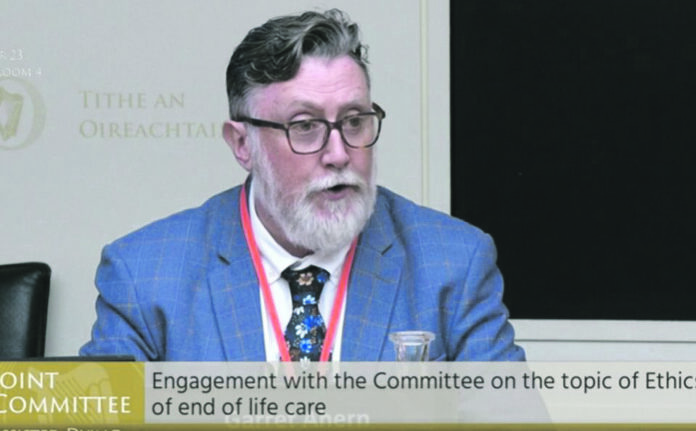
A LIMERICK man who travelled with his wife to Belgium, where she availed of assisted dying six months ago, said she did not want to end her life but was enduring terrible pain that could not be relieved.
Garret Ahern told an Oireachtas committee last Tuesday that his wife, Vicky Janssens, a UCC lecturer, died on April 21 this year after she availed of assisted dying in a friend’s house in her native Belgium.
Ms Janssens was initially diagnosed with breast cancer, which later spread to her lungs, liver, and stomach, and was given a terminal diagnoses facing end-of-life palliative care.
Mr Ahern is now advocating that people in Ireland in certain situations should be allowed the choice of assisted dying.
Prior to his attendance at the Joint Committee on Assisted Dying, Mr Ahern told RTÉ’s Upfront programme that, of the approximately 9,000 cancer patients that die in Ireland annually, he did not believe that all of these patients died a peaceful death.
“If it is a peaceful death, it is a death of palliative sedation while we wait for the illness or death to ultimately take that patient, which can take days or weeks,” Mr Ahern told the programme.
“I believe there needs to be a choice for the Irish people to have their say as to whether or not they believe that a dignified, peaceful death is an option for them, or whether or not we must endure with the system that we have.”
Mr Ahern was one of four people to give personal testimonies to the Oireachtas committee, including Tom Curran, whose late partner Marie Fleming, a multiple sclerosis sufferer, took a High Court case a decade ago to allow for assisted dying.
Garret Ahern told the committee: “Although we received the most excellent care in the oncology services available in Cork, no relief could be found to alleviate Vicky’s suffering from her illness.”
“I do not have the words to attempt to describe the pain that she endured in the last months of her life. It was that pain that drove her to attempt to end her own life by suicide in February.
“These were not the actions of an individual whose thoughts had become destabilised by pain and fear, rather the well-conceived, well thought-out, and rational actions of a person who could not endure her suffering.”
His wife’s death, he said, was “incredibly dignified, respectful, and most importantly pain-free..not only was it pain-free, it marked an end to the incredible pain Vicky was suffering”.
However, Elma Walsh appealed to the committee not to recommend the introduction of assisted dying in Ireland.
Ms Walsh said that her son Donal “died with dignity and got to complete most of the things he wanted to do” with the “help of palliative care”.
“I fear what this committee could set in motion, because if it removes the present legal requirement that doctors do what they can to save lives, the value of life will be significantly reduced.
“Can anyone here guarantee that elderly people won’t be subtly or overtly pressured into taking life-ending pills, in a situation where they are living in a family house and the child or grandchild is looking for a house?” Ms Walsh added.


